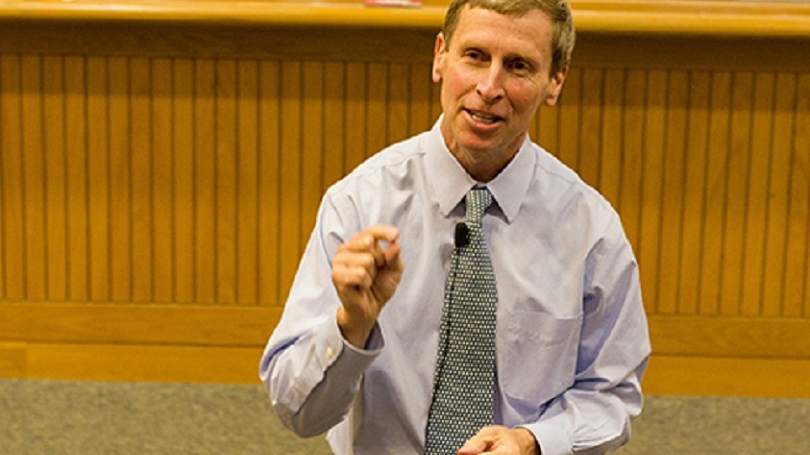
- Public Policy
- Leadership
- Funding
- News & Events
- About the Center
Back to Top Nav
Back to Top Nav
Back to Top Nav
Back to Top Nav
The Nelson A. Rockefeller Center for Public Policy and the Social Sciences nominated former NH Governor John H. Lynch, as the first Perkins Bass Distinguished Visitor.
Named after longtime New Hampshire U.S. Congressman Perkins Bass and member of the Dartmouth College Class of 1934, this appointment is meant to celebrate a New Hampshire citizen who has made outstanding contributions in government, and provides Visitors the opportunity to share their knowledge with the Dartmouth community.
With eight years of experience as governor of New Hampshire behind him, John Lynch spoke at Dartmouth this week about the importance of bipartisanship at the state and national level.
“I think we have to be optimistic that we can solve the problems if we can work together,” Lynch told his audience at the Nelson A. Rockefeller Center.
The state’s longest-serving governor in nearly 200 years spoke for more than an hour, touching on his experience in business, New Hampshire’s role in the political process, and challenges facing the state and nation. This was Lynch’s first lecture as the inaugural Perkins Bass Distinguished Visitor, named for Perkins Bass ’34, a former U.S. Representative from New Hampshire who died in 2011.
Lynch, a Democrat, said one challenge facing New Hampshire and the nation is partisan politics. He said officials in the highest offices must take the initiative and set the example of working across the aisle.
“I think the onus is on the governor, or the president, to demonstrate that you are going to be bipartisan,” said Lynch.
Lynch’s commitment to bipartisanship was on display: Republican Charlie Bass ’74, a former U.S. Representative and the son of Perkins Bass, gave Lynch a glowing introduction.
“There are few people in public life for whom I have more respect,” said Bass. “Nobody understood the institution of governor better.”
Lynch, who spent much of the day meeting with classes and students, talked about the significance of attracting businesses to the state to provide jobs. A former businessman himself, Lynch said the best way to do this is by helping companies improve sales and cut costs through lower taxes and incentives. It is also important for elected officials to be accessible to companies, Lynch said.
“I would regularly call CEOs from other states who I was aware were thinking about relocating to New Hampshire,” he said. “It is that accessibility, it’s that personal connection, that gave businesses comfort that they could come to New Hampshire.”
Accessibility is also important to the state’s politics. Noting New Hampshire’s significance as the site of the first presidential primary, Lynch said it is a place where candidates answer tough questions from voters in homes and town halls.
“It forces candidates to meet with real people, and not just run media campaigns,” Lynch said. “I think candidates who enter the New Hampshire primary not only become better candidates, but they ultimately become better presidents of the United States, if in fact they are successful.”
During the New Hampshire campaign, candidates often visit Dartmouth, which has a history of hosting debates—most recently the Republican Presidential Debate in 2011.
Lynch himself has close ties to Dartmouth: He is married to Susan Lynch, a physician who completed her pediatric residency at Dartmouth-Hitchcock Medical Center, and the couple have three children—Jacqueline, Julia ’11, and Hayden ’16.
“It was a treat to hear Governor Lynch speak about his state,” said Zach Williams, MALS ’13. “The governor enjoyed historic approval ratings during his tenure; I think it’s important to try and capture what made him such a successful leader and public official.”
Lynch fielded a number of questions from the audience, including one from a student who asked Lynch what he wished he had known as a 22-year-old.
“That’s a good question,” Lynch said, smiling and pausing. “What I didn’t know at 22 was that my interests would change.”
He told the student not to worry too much about what he is going to do for a career.
“Coming from Dartmouth,” said Lynch, “you’re going to get opportunities presented to you that you can’t even imagine.”
--This article by Keith Chapman titled "Former Governor Lynch Talks Bipartisanship, Business" originally appeared in the Dartmouth News on January 31, 2013.